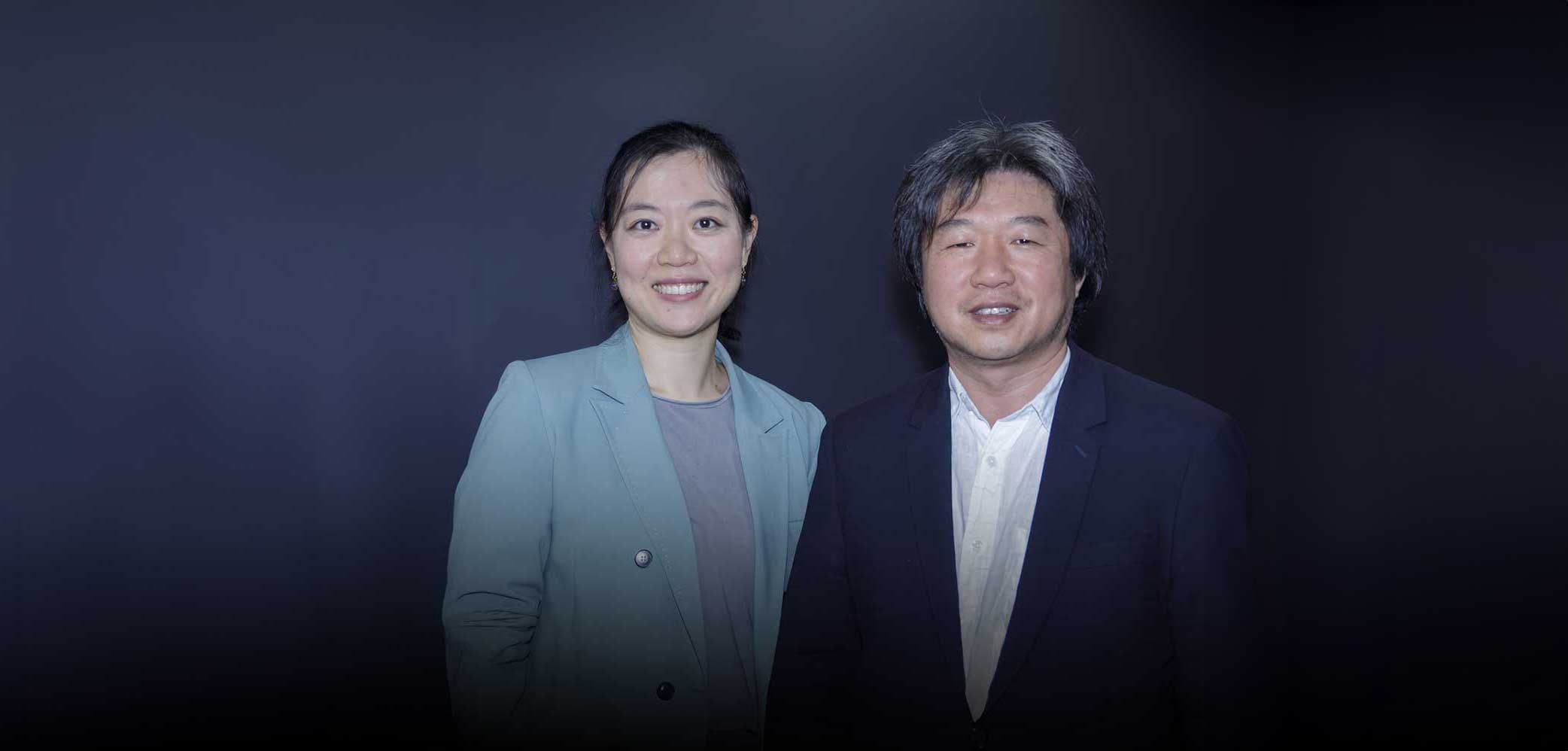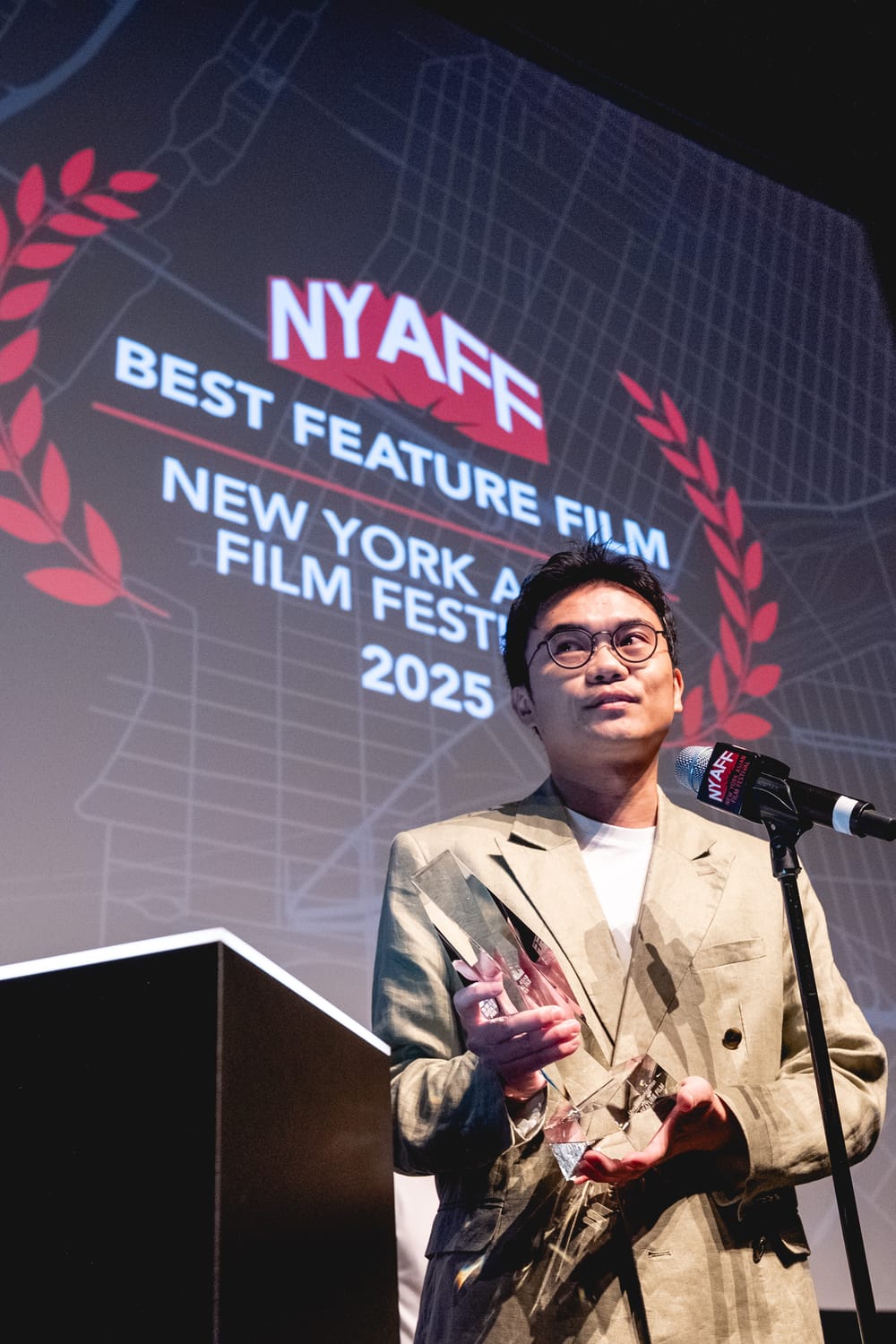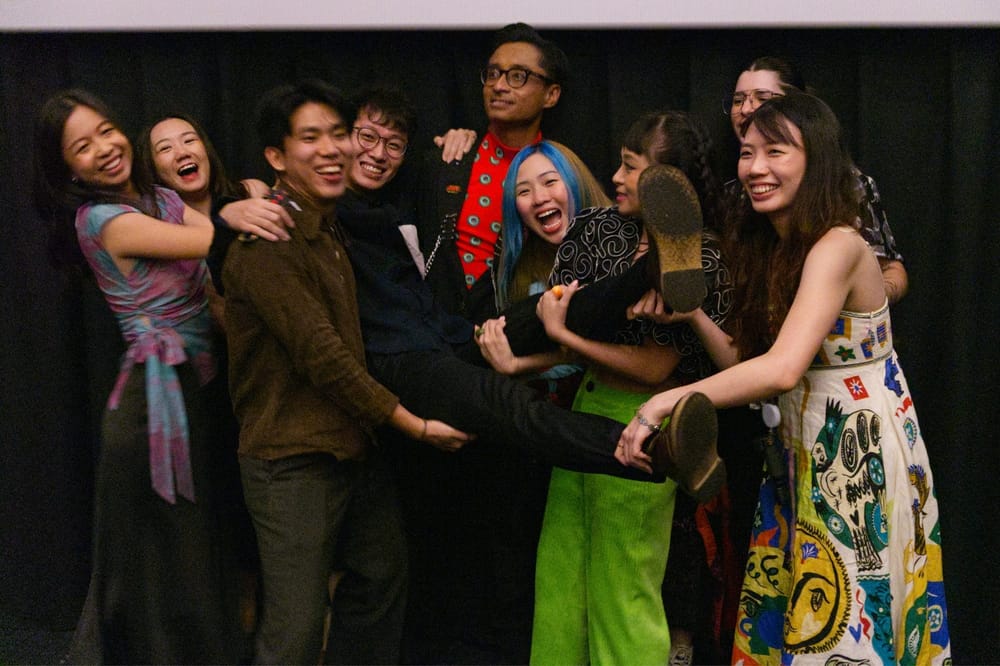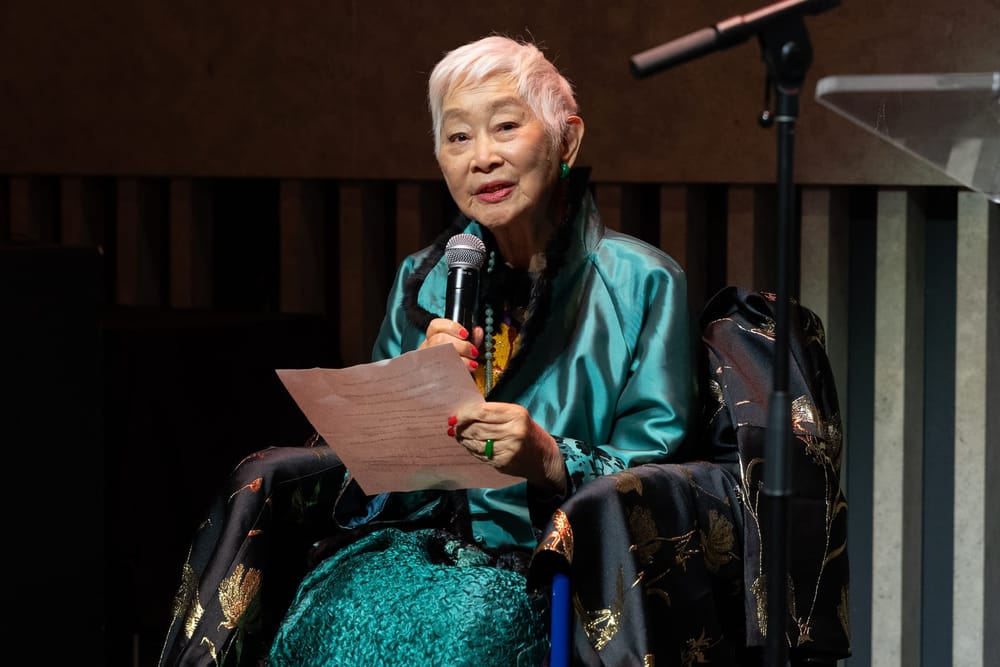By NYAFF
Welcome to UNCAGED, your podcast gateway to Asian cinema. Today, we're exploring Chinese independent cinema through the lens of the critically acclaimed documentary, "Youth (Spring)," directed by Wang Bing.
"Youth (Spring)" offers an intimate portrayal of rural migrant workers in Zhili, near Shanghai. Wang Bing meticulously captures their lives over five years, focusing on their struggles and emotional bonds formed amidst economic hardship. The film delivers a potent depiction of the impact of China's swift development on a new generation, providing an unfiltered look into the human cost of economic transformation.
In this episode, we're privileged to be in conversation with Wang Bing himself. Known for his stark realism, his works have earned him a place among the most respected figures in filmmaking. Joined by podcast moderator, documentary director Sun Ningyi, we'll uncover the inspiration behind "Youth (Spring)," discuss challenges faced during filming, and gain insights into the current state of filmmaking and cinema in China.
Join us as we delve into the story behind "Youth (Spring)' and the mind of an extraordinary filmmaker, Wang Bing. Let's embark on our cinematic journey!
On Soundcloud
This podcast was conducted in Mandarin and has been condensed for clarity.
Sun Ningyi: First off, congratulations on your film Youth (Spring) being nominated for The Golden Horse Award for Best Documentary Feature. It recently had its U.S. premiere at the New York Film Festival and its North American premiere in Canada at the Toronto International Film Festival. How did you feel about the Q&A sessions with the audience yesterday? Were there any surprising questions?
Wang Bing: It was all pretty standard. Everyone was quite direct and honest with their questions. Just the typical questions you’d expect after watching a movie.
SN: When I watched Youth (Spring), I was struck by the wide time span and the wealth of content. It felt as if the filmmaker was living right around there. What were your living conditions like at that time?
WB: We were filming in Zhili Town. There are many villages like this around there and near Taihu Lake. We stayed in a small town, where the living conditions were very good. Since the economy in Zhejiang is quite developed, life there is comfortable and the facilities are excellent in every aspect.
SN: The environment shown in the movie isn’t a normal living environment, so it’s quite surprising.
WB: Yes, it’s actually a factory. Although it looks small, it’s in fact a large space used for production. A production space is different from an actual living space; there’s often excessive industrial waste, and the walls are dirty and messy. But that’s just the nature of a factory building.
SN: So the mess we see is quite normal then.
WB: Yes, quite normal.
SN: Right. I understand that the length of a creative work is determined by what’s needed by the depth of expression and where the narrative goes. But was there a point during the filming process when you had to decide whether to make this a multi-character story or not invest too much time in it? Is this something you decide during the shoot?
WB: Well, generally, no. Time constraints can be a limiting factor for a shoot. At the start of any project, it's crucial to consider other preparatory aspects, like managing production costs. And it's not just about my own planning; the crew has to be on board and capable of adhering to the proposed schedule. Everything needs careful consideration right from the outset.
SN: Was the five-year shooting period for Youth (Spring) part of your initial plan?
WB: Yes, it was. Of course, others worked with us too. The principal photography took about two years. In the following three years, we filmed less. We focused on filming key moments and key characters during that time.
SN: You’ve mentioned before that in artistic creation, you have a duty to present traces of human existence and also a duty to control your own desires. What do you mean by “your own desires”?
WB: Creation is a journey. I mean: sometimes, in the pursuit of excellence, you might want to experiment with various filming techniques. Of course, it's crucial to maintain a balanced approach. When filming individuals, it's essential to be mindful of their comfort and the potential pressure that being in front of the camera may impose on them. This pressure can fluctuate in intensity and should never cross a certain threshold.
SN: So, there’s a moment when you feel, “Okay, I should stop here”?
WB: Yes, there’s definitely a limit.
SN: I remember in Youth (Spring), there was a scene where a young couple ran into a room, and the door closed. I really wanted to follow them inside, but then the story switched to something else.
WB: Yes, that’s how it is. Youth (Spring) mainly focuses on individuals who are of age to be married- relatively young people.. In their professional environment, their workload consumes most of their time and spills over into their private lives. Many devote years to this industry - for some, it spans over a decade or two. Typically, an individual's most vibrant and energetic years span from their teens to their twenties. Yet once you hit thirty and get married, that energy is often completely gone due to various pressures and demands from real life, like the very real burdens of family responsibilities, your job, and the pressure of aging. Thus, for them, their peak years are usually during this period.
SN: Right, but they’re worn down by such repetitive work. The spaces and moods you captured [in Youth] are somewhat confined to their experiences, capturing merely a fleeting moment or a few years. So, the film feels a bit heavy in the end. You mentioned earlier that the term “youth” was imbued with a sense of energy and vitality in the 1950s and 60s. Yet, in this film, you juxtapose this term together with their lives. What were you thinking at that time?
WB: Youth itself is actually a neutral word. Is it a noun? I’m not sure if it’s a noun or an adjective (laughs). It’s a neutral term anyway. However, at different stages, particularly in the Chinese context, the term was widely used in revolutionary idealism and revolutionary realism. Therefore, when Chinese people hear the word qing chun "青春" (youth), what flashes in their minds is not just something about a person’s youth, but also other, larger symbolic connotations. My film has none of that symbolism. It boils down to the person, the individual world, individual life, individual time, and the time of youth. That’s the lens through which “youth” is examined in my film.
SN: I remember you mentioned wanting to break away from a certain pattern in Chinese cinema over the past 20 years and use a form of direct imagery. Can you elaborate on what “direct imagery” means to you?
WB: Direct imagery is quite straightforward. It’s like when the Lumière brothers invented the camera and filmed a train arriving at a station – that’s a form of direct imagery, nothing too elaborate. When a camera first captures and replicates an image, the aesthetics and significance of the image emerge. Then, because people use film for various purposes, adding many embellishments and decorations, imagery progressively strays from its original quality. Its most fundamental essence might fade over time. So for me, my approach is to aspire for imagery to revert to its most unadulterated meaning and the primal nature of film.
SN: But in post-production, do you need to balance the raw quality of direct imagery with the narrative needs? Or if someone wants more dramatic tension, do you consider this balance during editing?
WB: Well, I think that’s a separate issue. All editing is subjective. Documentaries, at the outset, underscore their own record-keeping, their nature as documentaries. But once you enter the editing phase, they adopt a second perspective, forming a new facet of the film. This step is absolutely subjective, devoid of objectivity. Therefore, during editing, it becomes essential to consider how to convey the message. How to convey it? It involves a director's viewpoint on the content filmed, on cinema itself, their aesthetic values or standards, or the essence of film. so the director plays a pivotal role at this juncture. Like any film, direct cinema also falls under the control of human subjectivity and creativity during the editing process.
SN: Do you feel that documentaries allow you to express yourself freely? Are there any limitations in expression? Aside from when you feel, “At this moment, I shouldn’t follow the subject any further.”
WB: This freedom is definitely limited. We say “freedom” because documentaries continually progress within an unknown story time, and this uncertainty reduces the sense that they were designed by people. Lowering the sense of design makes the film more organic, or rather, the inherent energy that springs forth from the character's life becomes more prominent within the film.
SN: Is originality something you pursue?
WB: It’s not about what I pursue personally. I believe that since there’s not a lot of originality in the history of Chinese film, it’s challenging for me to find what kind of cinematic language is necessary or even feasible in today’s context. Of course, there are many excellent films [in Chinese film history], but from a regional and overall film culture perspective, it’s quite weak.
SN: But isn’t it true that not just contemporary cinema, but global cinema as a whole, hasn’t had particularly innovative language expressions since the New Wave? Not just in China.
WB: First of all, there are three fundamental aspects of cinema. One of these is André Bazin’s theory of intellectual montage, which laid the foundations of cinema. Russian intellectual montage, and Sergei Eisenstein’s approach in particular had a huge impact on the entire history of film, as well as narrative parallel montage in American film. Although parallel montage may seem simple now,it has a distinctive language that gradually formed over time, establishing its own foundation in the history of film. China lacks this foundation, so from a critical perspective, Chinese cinema is actually quite simple. Of course, I’m not saying the history of Chinese cinema is simple. During the Shanghai era, a time marked by communism and the new left, and the influence of the international communist movement, Chinese films became the bedrock of revolutionary idealism and revolutionary realism. There were also some traces of influence from Hollywood and European films. After the Liberation, Xie Jin's films emerged, representing a complete shift to revolutionary realism, right? Revolutionary realism continued until 1980, and then the Fourth Generation emerged, focusing on realism and portraying ordinary people. Subsequently, the Fifth Generation appeared, learning from Japanese cinema, imitating Japanese films extensively. Many films were exactly the same as their Japanese counterparts in terms of story, plot, content, and visual style. There was no originality at all. Having won a few awards, it might make us (China) feel proud, but if you take a look at those films, you will find that they’re all imitations.
Of course, we don’t want to criticize this; I don’t want to criticize anyone. But as a film culture, how do we view history? Today, as a director coming from this region, I have to consider the state of cinema here. From what kind of context do we draw our perspectives to comprehend the contemporary film language of the world at large? Where does this language reside? Where are we? What can we do? For me, documentaries in the past in China might have been newsreels, TV films, and various other genres, but they weren’t serious documentaries about cinema; they were practical, functional pieces, meeting media needs, so they weren’t really documentary films, and they lacked cinematic aesthetics. Of course, this might sound harsh, but it’s the truth.
SN: Yes.
WB: After that, we talk about documentaries made by CCTV in the 1980s. But were those really documentaries? They were more like (TV) featurettes. What cinematic aesthetics could there be in them? There was hardly any aesthetic value to speak of. So, for me afterward, the question I faced was, as a documentary filmmaker, what should I do? What should I pursue? How far can I go in making documentaries? Or what kind of cinematic approach or language should I look for? How can I reconstruct a foundational film language? That’s why direct cinema suits me. I started by studying photography and then transitioned to film, so for me, working with imagery is pretty much second nature. This includes the aesthetics of imagery, from training to practice; I think I’m very skilled in this sense. So for direct cinema, I didn’t just copy, like the direct cinema in the U.S. at the time, but readjusted it, adjusting its narrative; also the language of contemporary cinema, like the Soviet style, Italian, and other European cinematic methods, has been re-adjusted and filtered for direct cinema.
In terms of structure, Youth (Spring) is about 20 minutes per segment, because there are many characters. If you talk about each character for just a few minutes, the whole film becomes very chaotic and basically unwatchable. So it requires that each segment has a sense of relative completeness, but it can’t exceed a certain range, or the film wouldn’t work. In 20 minutes, the story can focus on a specific character, while also fulfilling a multi-character visual structure. Although it’s a long documentary with many characters, it’s not a macro proposition. It’s not arranged in a panoramic or high-angle structure, nor is it a so-called ensemble structure. Each segment is not about an ensemble; each has its specific direction. The characters are very specific, but in the end, it builds a multi-character edifice. The longer the film, the simpler the narrative must be in each segment––as simple as possible. Because once many simple segments are combined, they become complex. If each segment is complex, the film becomes unwatchable. A ninety-minute or two-hour film doesn’t work like this, and its story can be more complex. Of course, there are films that are deliberately simple even if their running time is short. You always have to find a narrative approach that suits the film.
SN: Have you ever considered making narrative films based on real-life characters?
WB: Ah, that’s something for the future.
SN: For the future (laughs).
WB: Right, now it’s not possible, I can’t predict what will happen next.
SN: Because you said every time you make a film, there’s something unknown. Have you filmed in different regions with people whose culture is very different from your own? Because even the Yangtze River area made you feel some differences from your cultural background. How did you initially face these differences? Whether it’s geographical environment, daily life, or interactions between people.
WB: Yes, of course, filming in a different location is definitely not as comfortable, but you have to adapt. But for filming, we generally don’t have problems adapting, mainly it’s the living conditions that pose challenges.
SN: I particularly liked what you said before, about your characters being awakened when caught in the gears of fate. I’d like you to talk more about this.
WB: Actually, it’s about the working class or ordinary people who labor daily. Their lives may appear to be an endless cycle of work and modest earnings, seemingly devoid of creativity or substantial wealth. From another angle, they may come across as humble or perhaps as slow-witted. However, I don’t think that perception is true.
SN: I don’t get that impression at all.
WB: Actually, people are quite aware of their own circumstances. It’s just that in such a social structure, they lack a voice; no one listens to them, and no one wants to hear their thoughts. How they view things, in fact, nobody is willing to listen. This society wouldn’t give them the right to speak either. Their voices are essentially non-existent. Regarding their own plight, the world, and society as a whole, they are actually very clear-headed. The problems afflicting every society are, in fact, clear-cut. Just because you’ve read a few books doesn't qualify you as the sole authority on explaining these issues. This era has its own obvious or hidden delusions.
SN: Delusions?
WB: Yes, so I think when you look at these people, the characters in Youth (Spring), they are the weaker members of society. Their entire lives are predetermined. They will never break out; everything is designed for them by others. And who are the ones behind the design?
SN: Do you ask yourself these questions when you’re filming?
WB: I don’t need to.
SN: Because it’s quite obvious?
WB: I think if I keep asking I’d be a fool (laughs).
SN: (Laughs) You’ve been a documentary director for 20 years. Have you had a moment of awakening? Or is everything clearly laid out before you?
WB: What do I need to awaken to (laughs)? I’m not benighted, am I? why would I need to awaken? Right? There’s nothing to awaken to.
SN: You mentioned before that you also have certain mental struggles, possibly about many things – global integration, assimilation, about “I”, which of course can be understood as a nation, a person’s position. You briefly mentioned it before, I don’t know if you still remember.
WB: I think I forgot, remind me again.
SN: In the process of our personal lives continuously grappling with and taking in the reality of globalization, how should we face ourselves and face a homogenizing reality? You said your inner world is always confused. I don’t know if this is the contradiction between your pursuit of originality and the continuous convergence of many things in a globalizing world?
WB: Actually, it’s because there are many problems and contradictions in real life. You see society evolving in one direction, but there’s a lot of resistance to change everywhere, lots of variables, and some phenomena are just downright incomprehensible. At the same time, your own future, career, and life are all in this state of flux and uncertainty. Because of commerce and financial interests in this day and age, our fundamental perception of good and evil, basic morals, are confused. Right and wrong are often reversed, so it’s hard to say. In fact, these are the issues we face in this century. In our lives, right and wrong are frequently inverted, right? So it depends what perspective you adopt in life and vis-a-vis yourself. This is also history; this is how history is formed. But right and wrong are so strange. Often, at one moment, you find yourself in a conspiracy, feeling like you’re in the dark, or on the side of dark forces. Yet, at that particular moment, you might feel like you’re taking advantage of things.But at some point, you might no longer be the beneficiary. After the 21st century passes, you might be part of the most shameful aspect of it. Because history is constantly changing. Afterwards, no one wants to stand in the shadow of a shameful past. But the fact is that changes happen bit by bit, and many people choose to stand in that position.
SN: Maybe it’s hard to see things clearly in the present.
WB: Perhaps, perhaps. I think it might not necessarily be about not being able to see clearly. It’s more about people’s indifference to justice, right and wrong, and personal conscience. Or maybe they just don’t consider these issues, but they still want to claim a moral high ground. In the end, in what way will the history of these hundred years in the 21st century take shape? It’s actually being shaped step by step in our daily lives.
SN: So some people call you an “underground historian” (laughs).
WB: Ah, right, I’m not. I’m just a simple person. According to the social relations in China, you could say I’m somewhat foolish, not entirely stupid, just a bit naive. Maybe I just speak some truths. Actually, many people know things, they are not ignorant, but they just conform to a norm, or always choose a way to conform. Anyway, Chinese people always want to choose a way that is more advantageous for themselves. Of course, that’s understandable in life. But in the process of changing times, I often think what’s more important is that a person should not turn right into wrong, or black into white. You shouldn’t take something ugly and package it as something beautiful, deceiving others. I think that simple is not right.
SN: Then, seeing some historical inversions happening, do these influence how you express yourself in your films?
WB: I think maybe I’m just kidding (laughs).
SN: (Laughs) It seems like you’re actively thinking about these issues.
WB: I think I’m only responsible for my own films, I can’t be responsible for other things.
SN: Right. So, let’s move on to the last question. There are two more (films). Do you want to talk about them? What stage are they at currently?
WB: I can’t talk about them now. Because things that are not finished can’t be discussed. There are two more films, but we will slowly finish them in the coming months, in the next six months, perhaps we can talk about that then.
SN: Let me add a small question. Do you have any advice for this young filmmaker (me)?
WB: No. I don’t act as a teacher to others. I don’t think I can (laughs).
SN:How so?
WB: I’m not qualified to be a teacher to others.
SN: Any advice?
WB: No advice. Because I never advise others (laughs). I believe people rely on themselves. Advice from others is useless.
SN: Thank you, Director Wang. Thank you.
WB: You’re welcome.
Translation by Samuel Jamier and Lv Chuxu
Recording by Ryan Zhao
Photo by Gavin Li








